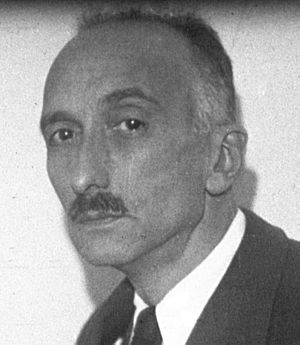François Mauriac facts for kids
Quick facts for kids
François Mauriac
|
|
|---|---|

Mauriac in 1933
|
|
| Born | François Charles Mauriac 11 October 1885 Bordeaux, Nouvelle-Aquitaine, France |
| Died | 1 September 1970 (aged 84) Paris, France |
| Occupation | Novelist, dramatist, critic, poet, journalist |
| Education | University of Bordeaux (1905) École des Chartes |
| Notable awards | Grand Prix du roman de l'Académie française 1926 Nobel Prize in Literature 1952 |
| Relatives | Anne Wiazemsky (granddaughter) |
| Signature | |
François Charles Mauriac (born October 11, 1885 – died September 1, 1970) was a very important French writer. He wrote many novels, plays, poems, and articles. He was a member of the famous Académie française (French Academy) from 1933. In 1952, he won the amazing Nobel Prize in Literature. He also received the Grand Cross of the Légion d'honneur in 1958, which is a very high award in France. Mauriac was a Catholic his whole life.
Contents
About François Mauriac
François Charles Mauriac was born in Bordeaux, France. He loved to study literature at the University of Bordeaux. He finished his studies there in 1905. After that, he moved to Paris to continue his education.
On June 1, 1933, he was chosen to be a member of the Académie française. This is a very special group that protects the French language.
Mauriac had strong opinions about politics. He used to support a certain political group. But during the Spanish Civil War, he changed his views. He disagreed with some actions of the Catholic Church at that time.
When France was taken over by the Axis countries during World War II, he first supported the government that worked with them. But soon, in December 1941, he joined the French Resistance. This was a secret group fighting against the occupation. He was the only member of the Académie française to publish a Resistance text.
After France was freed, Mauriac had some disagreements with other writers. He wrote for a newspaper called Le Figaro. Another writer, Albert Camus, thought that France should punish people who had helped the Axis powers. But Mauriac believed that everyone should try to get along for the good of the country. He also worried that justice might not be fair because of all the strong feelings after the war. Even though another writer, Robert Brasillach, had criticized him, Mauriac tried to save him from being executed.
Mauriac also spoke out against France's control over Vietnam. He strongly condemned the use of torture by the French army in Algeria.
In 1952, he won the Nobel Prize in Literature. The award was given to him "for the deep spiritual insight and the artistic intensity with which he has in his novels penetrated the drama of human life." This means his books explored deep human feelings and life's challenges. In 1958, he received the Grand Cross of the Légion d'honneur.
He wrote many personal memoirs, which are like stories from his own life. He also wrote a biography about Charles de Gaulle, a famous French leader.
Mauriac's complete works were published in twelve books between 1950 and 1956. He encouraged Elie Wiesel to write about his experiences as a Jewish teenager during the Holocaust. Mauriac even wrote the introduction for Elie Wiesel's famous book, Night.
François Mauriac was the father of writer Claude Mauriac. He was also the grandfather of Anne Wiazemsky, a French actress and author. She worked with and married the French director Jean-Luc Godard.
François Mauriac passed away in Paris on September 1, 1970. He was buried in the Cimetière de Vemars, Val d'Oise, France.
Awards and Special Recognitions
- 1926 — Grand Prix du roman de l'Académie française (Grand Prize for Novels from the French Academy)
- 1933 — Became a Member of the Académie française
- 1952 — Won the Nobel Prize in Literature
- 1958 — Received the Grand Cross of the Légion d'honneur
His Writings
François Mauriac wrote many different kinds of books and plays.
Novels and Stories
- 1913 – L'Enfant chargé de chaînes («Young Man in Chains»)
- 1914 – La Robe prétexte («The Stuff of Youth»)
- 1920 – La Chair et le Sang («Flesh and Blood»)
- 1922 – Le Baiser au lépreux («A Kiss to the Leper»)
- 1925 – Le Désert de l'amour («The Desert of Love») (This book won the Grand Prix du roman de l'Académie française in 1926.)
- 1927 – Thérèse Desqueyroux («Thérèse»)
- 1932 – Le Nœud de vipères («Vipers' Tangle»)
- 1933 – Le Mystère Frontenac («The Frontenac Mystery»)
- 1941 – La Pharisienne («A Woman of Pharisees»)
- 1951 – Le Sagouin («The Weakling») (A shorter novel)
- 1954 – L'Agneau («The Lamb»)
Plays for the Stage
- 1938 – Asmodée («Asmodée; or, The Intruder»)
- 1945 – Les Mal Aimés
- 1948 – Passage du malin
Poetry Collections
- 1909 – Les Mains jointes
- 1911 – L'Adieu à l'Adolescence
Memories and Biographies
- 1931 – Holy Thursday: an Intimate Remembrance
- 1960 – Mémoires intérieurs (Inner Memories)
- 1937 – Life of Jesus
- 1964 – De Gaulle de François Mauriac (A book about Charles de Gaulle)
Images for kids
See also
 In Spanish: François Mauriac para niños
In Spanish: François Mauriac para niños


